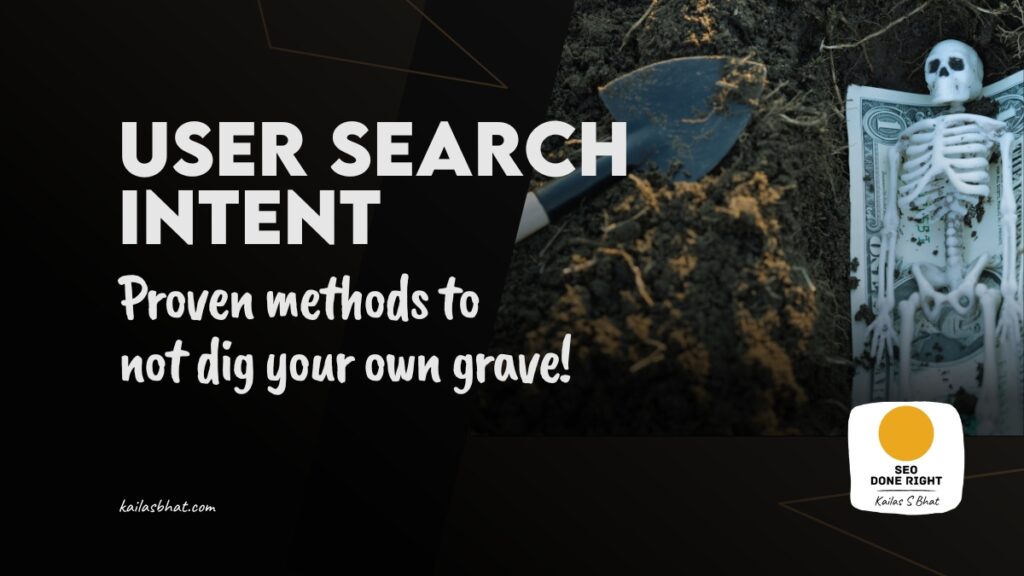
How does it feel to be buried underground, say 10 feet under? Can’t imagine it, right? You and me both, my friend!
I know, it is a dark note, to begin with. Let’s change that!
How about feeling buried with loads and loads of tiring tasks? A soar seat (you know what I mean) 😬, aching shoulders, dry eyes, tired back, or that constant frustration of not being able to keep up? You aren’t able to relax with the stockpile of daunting tasks, weighing on you. Easier to relate now, right?
Being buried doesn’t feel good at all. The same goes for your business. Buried under top search results, 10 pages under…
You’ve got to be in the top 2 pages if not the first position of page 1. We’ll get to page 1, but one step at a time, my friend.
Step number 1️⃣ in your journey to page 1 would be to understand why anyone searches online in the first place, their intent, and the kind of words they use to find what they want. In SEO lingo, we love to call them ‘Search Intent’ & ‘Keywords’.
So, let’s crack the code of SEO and ASO with a beginner’s guide to different types of search intent.
Table of Contents
Search Intent, what are they?
“Why does someone search online?” 🤔
If you can answer this one simple question, you are halfway to figuring out what search intent is.
Now, different types of keywords (or search terms) can align with different types of search intent. So, it’s important to understand search intent when choosing the right keywords for your website or app.
There are four types and let’s explore them all.
1. Informational Intent
Do you remember the last things that you searched on your browser? Mine was, “What is a CatPooChino?” 🐈💩☕
If you searched, seeking information on something or someone, we can call them keywords with informational search intent.
These keywords are typically long-tail keywords that focus on answering a specific question or providing detailed information.
2. Navigational Intent
Did you search for Gmail, amazon or maybe LinkedIn? Most probably you were looking to get to your Gmail inbox, to track your Amazon order or to check your LinkedIn feed.
If yes, they can be termed as keywords with navigational intent. 🧭
Navigational intent is when someone is searching for a specific website or app. People use navigational intent when they already know what website or app they want to visit, but they don’t remember the exact URL.
3. Commercial Intent
“Running Shoes” or “best food delivery app”
Keywords have commercial intent when people are looking for a product or service but aren’t necessarily ready to make a purchase. 🏬
The keywords associated with commercial intent are typically short-tail keywords that describe the product or service.
4. Transactional Intent
“buy pink running shoes”, “biryani near me”.
When people search with transactional intent, they are ready to make a purchase. The keywords associated with transactional intent are typically long-tail keywords that include phrases like “buy” or “order.” 💳
If you nail it in identifying the search intent behind a search your customer makes, you can choose the right keywords to target your audience and increase your chances of converting them into customers.
Use tools like Google’s Keyword Planner, Ahrefs Keyword Generator or SEMrush Keyword Magic to research keywords based on search intent and include them naturally in your website or app’s content.
In our next article, “6 Keyword types and the powerful role they play in SEO ” we will understand the various types of keywords and how to match them across the 4 search intent that we have learnt about today.
BTW, if you're a small business owner or just starting in the SEO world, my guidebook is the perfect tool to help you 10x your SEO efforts. Click here to grab your copy right away!
Do you want to become the next blockbuster hit of the search engine world? Then listen up! Just like a movie, SEO is all about getting the attention of the audience and making them love you.
So let me guide you through the best tips and tricks for keyword research, on-page optimization, technical SEO, link building, local SEO, and user experience.
With careful planning, attention to detail, and a little bit of creativity, you’ll be well on your way to improving your search rankings and becoming the star of the show.
If you need help with SEO, driving traffic, generating leads, increasing brand awareness, or getting more users, all you need to do is, contact me from here.

Pingback: 6 Keyword types and the powerful role they play in SEO